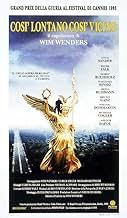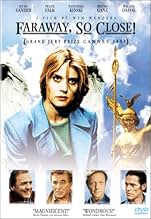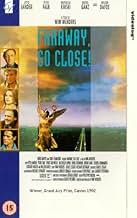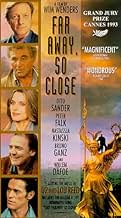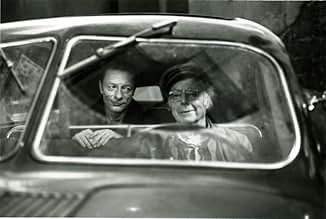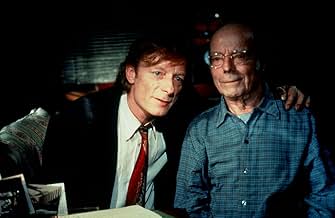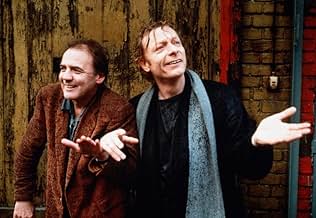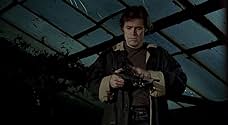IMDb RATING
7.2/10
9.6K
YOUR RATING
A group of angels in the German capital look longingly upon the life of humans.A group of angels in the German capital look longingly upon the life of humans.A group of angels in the German capital look longingly upon the life of humans.
- Awards
- 4 wins & 7 nominations total
Mikhail Gorbachev
- Mikhail Gorbachev
- (as Michail S. Gorbatschow)
Featured reviews
10Firas
I can say this movie is one of the best movies I have ever watched (and I watched a lot of them). The roles were very well interpreted by good actors. Even when they are no actors at all, as Mikhail Gorbachyov who appears in a scene. Many things make this movie special. In it five languages are being spoken. Nevertheless it doesn't really matter. The protagonists can understand what is being said as though language difference is not that relevant for humans to understand each other. The pictures are the usual great Wim Wenders pictures. Black and white pictures indicate the coolness of the world of angels while colors indicate how colorful the world could be for humans (if they can see it!). It is an analysis of the relationship of man with the world around. Humans think that they are controlling the world, but the world is controlling their lives in fact. It shows how blind we can be in contemplating the beauty of the world around us. In this matter one could mention the movie called "The awakenings" (1990) although the two movies are in most aspects different. It is a movie about an angel who wants to become human in order to be able to understand humans, and how he gets into a complicated life. It helps a lot to see "The wings of desire" where the story between angels and humans started. Some things are hard to understand when you don't know the first movie. This movie is also an analysis of time. Emit Flesti (read backward Time itself) is a very interesting character that can communicate with both angels and humans, and who speaks about almost always about time and its meaning. For me he was also a mix of Lucifer and the death angel as well. The background of the whole story is Berlin after the fall of the wall, whereas "The wings of desire" took place before the end of the cold war.
This movie makes a genius use of fantasy to analyze our lives. Its main message is : "We (the angels) are not the message. We are the messengers and the message is love".
This movie makes a genius use of fantasy to analyze our lives. Its main message is : "We (the angels) are not the message. We are the messengers and the message is love".
Wim Wenders may not be taken seriously by Hollywood (or critics) anymore, but he seems able to pull in actors and musicians at will. Great soundtrack.
Great cast as well. Check out Horst Bucholz (sp?) here and in the 1962 comedy "One, Two, Three" with James Cagney. All the "mortals", especially Bruno Ganz, seem almost gleeful. Only Willem Dafoe appears to be in a "serious German movie".
I may not be qualified to comment on the real value of this movie because "Wings of Desire" is in my permanent top 5. It probably benefits from the glow of it's precursor more than any other sequel, because I really wanted to catch up with these characters. I smiled every time I saw a familiar face.
That said, it takes about an hour to settle in but finally gets sort of serious. Watching this and "Until the End of The World" (also ripped by critics) I get the feeling Wenders was either being lazy or just freestyling to avoid boredom. Looks like fun from here.
Great cast as well. Check out Horst Bucholz (sp?) here and in the 1962 comedy "One, Two, Three" with James Cagney. All the "mortals", especially Bruno Ganz, seem almost gleeful. Only Willem Dafoe appears to be in a "serious German movie".
I may not be qualified to comment on the real value of this movie because "Wings of Desire" is in my permanent top 5. It probably benefits from the glow of it's precursor more than any other sequel, because I really wanted to catch up with these characters. I smiled every time I saw a familiar face.
That said, it takes about an hour to settle in but finally gets sort of serious. Watching this and "Until the End of The World" (also ripped by critics) I get the feeling Wenders was either being lazy or just freestyling to avoid boredom. Looks like fun from here.
"Faraway, So Close!" is a very confusing movie if one has either not seen its predecessor, "Wings of Desire," or knows something about that movie. I was in that state when I first viewed "Faraway, So Close!" and could only think that I was watching an artsy movie. Fortunately, the movie is now available on DVD in a widescreen anamorphic version with the director's commentary of Wim Wenders. The movie began in black and white and seemed to morph every now and then into color that had me wondering whether or not I had a defective DVD. Eventually, I figured out, as the movie was running, that this was intentional with the black and white sequences depicting the angel(s) observing humans. In the meantime, I managed to miss much of the subtlties of the movie that were only revealed from the lips of Wim Wenders in his running audio commentary. With a backdrop of Berlin, the movie was filmed in German. Fortunately, there are English subtitles and it is sometimes odd when the dialog actually breaks into English. As Wenders points out, this was his third movie with Nastassja Kinski that began with her very first movie in 1975, "The Wrong Movement," and was followed by the 1984 "Paris, Texas." Spaced approximately 10 years apart and with "Faraway, So Close" in 1993, Wenders mentioned that it is now time to do a fourth picture with Nastassja. One can only hope that it materializes.
The basic story has to do with the protagonist as Cassiel, the actor Otto Sander, taking human form from his previous angelic state in which he can only observe and sympathize. An event propels his wishful transformation into the human dilemma. Wim Wenders said that this film was a continuation of "Wings of Desire" and not a sequel. It is probably splitting hairs because I do not readily understand the difference, if any. Nastassja Kinski has the major supporting role of Raphaela and is always shown in black and white. Raphaela becomes Cassiel's, always present, angel. It is a very difficult role to pull off because Nastassja only has her voice (in German), her facial expressions, her hands, and her body movements to bring her character to life. Her on screen presence appears natural and effortless. It is nothing less than a superb performance of a first rate actress. But it is up to Otto Sander to carry the movie. The supporting cast is first rate.
My third viewing of the film was an experience. 146 minutes passes relatively quickly. The film is dripping with intensity and is larger than life. Wim Wenders' vision and its execution is astonishing and will reverberate through time because it captures the essence of life and death. It is a movie director's awesome tour de force.
The basic story has to do with the protagonist as Cassiel, the actor Otto Sander, taking human form from his previous angelic state in which he can only observe and sympathize. An event propels his wishful transformation into the human dilemma. Wim Wenders said that this film was a continuation of "Wings of Desire" and not a sequel. It is probably splitting hairs because I do not readily understand the difference, if any. Nastassja Kinski has the major supporting role of Raphaela and is always shown in black and white. Raphaela becomes Cassiel's, always present, angel. It is a very difficult role to pull off because Nastassja only has her voice (in German), her facial expressions, her hands, and her body movements to bring her character to life. Her on screen presence appears natural and effortless. It is nothing less than a superb performance of a first rate actress. But it is up to Otto Sander to carry the movie. The supporting cast is first rate.
My third viewing of the film was an experience. 146 minutes passes relatively quickly. The film is dripping with intensity and is larger than life. Wim Wenders' vision and its execution is astonishing and will reverberate through time because it captures the essence of life and death. It is a movie director's awesome tour de force.
To enjoy this movie, view it as a poem. It relies on the language of the heart and asks its viewers to see it as it truly is, through the same myopic eyes to try and understand a dream. There is the duality of existence we all face, mirrored through the experience of an angel who falls to earth, who falls precisely because he can no longer contain himself within the restrictions of his identity. The central metaphor of this movie is about the passion, truth and love we are all promised, should we choose to live life as we were meant. There are the difficulties of trying to live out our singular purpose, the disappointments of relation, the trials of being part of something greater than self. In all these, there is also the beauty inherent, and ultimate understanding. The triumph of beautiful release, when we realise that all that has gone before is both behind us and a part of what we are, and the relief of becoming an individual, and understanding and embracing aspirations gained and lost.
"Faraway, So Close!" is filmmaker Wim Wenders' follow-up to his well-regarded "Wings of Desire". Once again, an angel (Otto Sander as Cassiel) chooses to descend from the heavens and live among humans. Cassiel reunites with old friend Damiel (Bruno Ganz), getting involved in the lives of Damiel & his family and assorted others. Human life, he finds, is full of all sorts of ups and downs, and is notable for its unpredictability.
With Wenders making philosophical musings on the nature of time itself, he creates a rich gallery of engaging characters, all acted to perfection by a stunning international cast (Peter Falk, Lou Reed (playing themselves), Willem Dafoe, Horst Buchholz, Nastassja Kinski, Heinz Ruhmann, Rudiger Vogler, etc.). Even world leader Mikhail Gorbachev turns up in a quick cameo to ponder the meaning of it all. The script is very literate and heartfelt, and this viewer couldn't help but be moved by the ever-twisting tale, right up to the ending.
Granted, such a film isn't for everyone, especially since "Faraway, So Close!" runs close to two and a half hours. It's beautifully made, however, with seamless transitions from black & white (the way that the angels see the world) to colour and then back again. And the score is wonderful, with soundtrack contributions by Reed (who appears in concert), U2, and Johnny Cash. The story may not always be completely absorbing: this viewer enjoyed the tale more in the early going, as Cassiel adjusts to living as a human, before the plot gets bogged down in an effort to foil master criminal Buchholz.
Even with its imperfections, this IS fairly powerful stuff, and a worthy viewing for lovers of European cinema.
Seven out of 10.
With Wenders making philosophical musings on the nature of time itself, he creates a rich gallery of engaging characters, all acted to perfection by a stunning international cast (Peter Falk, Lou Reed (playing themselves), Willem Dafoe, Horst Buchholz, Nastassja Kinski, Heinz Ruhmann, Rudiger Vogler, etc.). Even world leader Mikhail Gorbachev turns up in a quick cameo to ponder the meaning of it all. The script is very literate and heartfelt, and this viewer couldn't help but be moved by the ever-twisting tale, right up to the ending.
Granted, such a film isn't for everyone, especially since "Faraway, So Close!" runs close to two and a half hours. It's beautifully made, however, with seamless transitions from black & white (the way that the angels see the world) to colour and then back again. And the score is wonderful, with soundtrack contributions by Reed (who appears in concert), U2, and Johnny Cash. The story may not always be completely absorbing: this viewer enjoyed the tale more in the early going, as Cassiel adjusts to living as a human, before the plot gets bogged down in an effort to foil master criminal Buchholz.
Even with its imperfections, this IS fairly powerful stuff, and a worthy viewing for lovers of European cinema.
Seven out of 10.
Did you know
- TriviaMikhail Gorbachev: only appears because his secretary was familiar with the movies of Wim Wenders and was a great admirer. She talked Gorbachev into giving up a couple of hours to do the cameo as he was on a trip to Germany anyway.
- GoofsAfter Cassiel meets Anton Becker and returns to Angelo's pizzeria, he meets Emit Flesti and Damiel puts his flour stained hands on Flesti's shoulder, leaving a white mark on the black suit. The next time we see Flesti, moments later, there is no white mark.
- Quotes
Emit Flesti: Let me explain a couple of things. Time is short. That's the first thing. For the weasel, Time is a weasel. For the hero, Time is heroic. For the whore, Time is just another trick. If you're gentle, your Time is gentle. If you're in a hurry, Time flies. Time is a servant, if you are its master. Time is your god, if you are its dog. We are the creators of Time, the victims of Time, and the killers of Time. Time is timeless. That's the second thing. You are the clock, Cassiel.
- Crazy creditsThe film is dedicated to actor Curt Bois who worked with Wim Wenders in "Der Himmel über Berlin".
- Alternate versionsThe original running time at the world premiere in Cannes in May 1993 was 165 minutes. Despite winning the 'Grand Prize of the Jury' for this version, the director re-edited the film to make it shorter and improve the narrative. Unfortunately, the original version was never released again, so the Cannes reviews are actually about a slightly different film, than the 146 minutes version we know today.
- ConnectionsFeatured in U2: Stay (Faraway, So Close!) (1993)
- SoundtracksBerlin
Written and Performed by Lou Reed
- How long is Faraway, So Close!?Powered by Alexa
Details
- Release date
- Country of origin
- Languages
- Also known as
- Tan lejos y tan cerca
- Filming locations
- Sophienkirche, Große Hamburger Str. 29-30, Mitte, Berlin, Germany(background exterior, Cassiel and Damiel walking to his restaurant)
- Production companies
- See more company credits at IMDbPro
Box office
- Budget
- $10,500,000 (estimated)
- Gross US & Canada
- $810,455
- Opening weekend US & Canada
- $55,019
- Dec 26, 1993
- Gross worldwide
- $810,455
- Runtime
- 2h 20m(140 min)
- Color
- Sound mix
- Aspect ratio
- 1.66 : 1
Contribute to this page
Suggest an edit or add missing content


